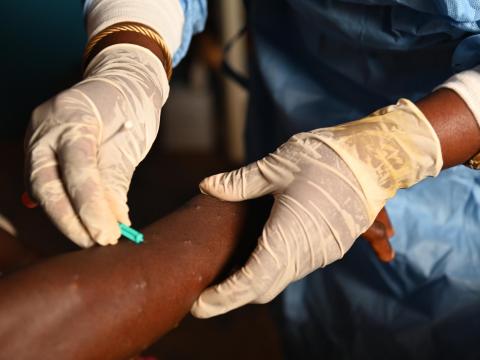DR Congo: Choisie's Battle Against Mpox After she Contracted the Virus while Treating the Patients

In the Salongo 2 Health Area of Gemena, located in the Sud-Ubangi province of the Democratic Republic of Congo (DRC), a seemingly ordinary morning marked the beginning of a life-altering experience for Choisie, a dedicated nurse.
Known for her compassion and commitment, Choisie had spent years caring for the patients. But one day, her own body became the battleground against an invisible enemy: Mpox.
"I still remember the day I started feeling feverish," she recalls. "At first, I thought it was just fatigue." Soon, however, skin eruptions began to appear, spreading from her feet to her hands. Fear has taken hold of the health center. Choisie, who had spent days treating patients without proper protective equipment, had contracted Mpox herself.
"It was frightening," she confesses. "I knew this disease could be serious, and I wasn’t sure how I would recover."
Her absence left a void at the clinic. Patients asked after her, and her colleagues deeply missed her presence. For several weeks, Choisie fought the illness in isolation, relying on limited resources. Looking back, she reflects, “I could have avoided this if I had the necessary equipment.”
The impact of her illness extended beyond her.
“This disease didn’t just affect me—it also put other healthcare workers and our families at risk, because we unknowingly brought it home,” she says.
It was at this critical moment that World Vision, in partnership with the Gemena Health Zone, intervened. The organization provided training for community health workers to recognize Mpox early and supplied essential protective gear for frontline staff.
"We received gloves, gowns, face masks, hand sanitizer, boots—everything we needed to work safely. Now, I can finally return to work without fearing for my health", explains Choisie.
The transformation at Salongo 2 Health Center has been significant. With better training and equipment, healthcare workers are no longer forced to take unnecessary risks.
“Before, we were constantly exposed. Now, we feel safe and can better educate the community,”Choisie says with relief.
While the fight against Mpox is ongoing, the response is now stronger and more coordinated—thanks to the dedication of healthcare workers and the support from World Vision.
"I am living proof of the importance of protection. Without it, we can't care for others. And without care, the community suffers. Today, we have the chance to change that", Choisie concludes.